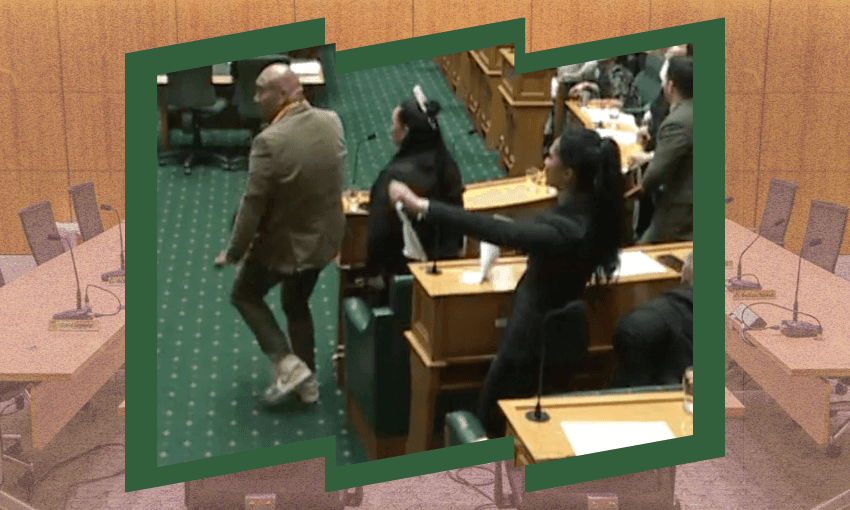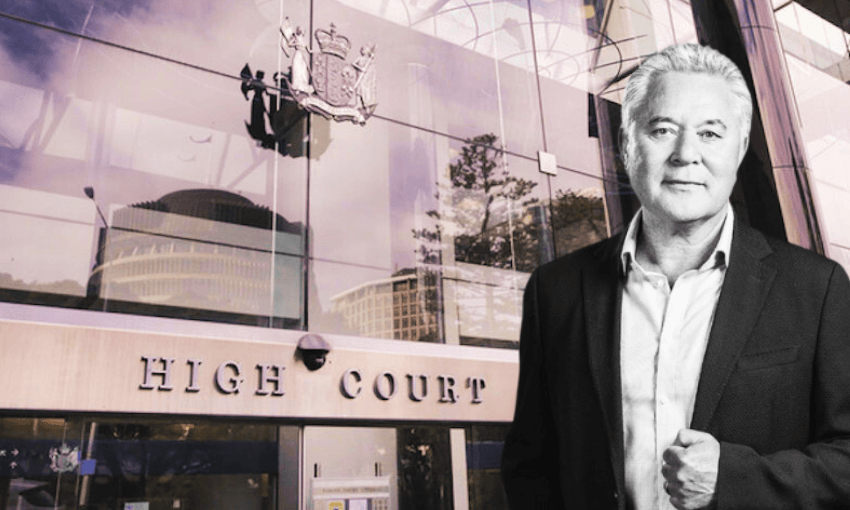The three MPs whose rule-breaking haka caught the world’s attention didn’t attend their scheduled hearing yesterday. Constitutional law expert Andrew Geddis has the rundown of what happened, why, and what’s likely to come next.
I see Te Pāti Māori and the privileges committee are in some sort of stand-off – what’s the beef about?
To really understand the issue, we’d need to begin with first contact between Māori and European explorers/agents of colonisation … and I don’t have the words or expertise to unpick the subsequent 383 years. So, let’s jump ahead to November 2024 and the haka led by Te Pāti Māori MP Hana-Rawhiti Maipi-Clarke in the House of Representatives. Following this action, three MPs (NZ First’s Shane Jones, National’s Suze Redmayne and Act’s Todd Stephenson) laid complaints with the speaker that this haka was a breach of parliamentary rules. The speaker agreed that the behaviour of four MPs who took part by leaving their seats and entering the floor of the House – Peeni Henare, Debbie Ngarewa-Packer, Rawiri Waititi and Hana-Rawhiti Maipi-Clarke – should be further considered by the privileges committee.
The “privileges committee” sounds awfully anachronistic. What exactly is it?
I’ve had cause to write about it before, back when it considered Rawiri Waititi’s breach of a court order when asking David Seymour a parliamentary question about Tim Jago, the convicted sex offender who had been his Act Party president. So, I’ll just recycle my description of the committee from back then.
If the speaker agrees a complaint about a parliamentary rule breach is serious enough, that matter goes to the House’s privileges committee, which by journalistic convention must always be referred to as “powerful”. Basically, it’s made up of senior MPs from all the parties. They then hold a kind of in-house trial, decide if what has happened is a breach of the rules, and then decide what penalty should apply.
So, four MPs got sent there by the speaker for performing the haka. What’s happened since?
One of those MPs, Labour’s Peeni Henare, had his time before the committee in mid-March. He accepted that he breached parliamentary rules by going onto the floor of the House to perform the haka, and the committee decided that while his actions were “disorderly”, in effect they did not amount to a “contempt” of the House. Peeni Henare then apologised to the House for his actions.
Hang on – what’s this “contempt” business all about?
Basically, a “contempt” of the House involves a finding that someone has acted in a way that stops the House or any of its members being able to carry out their functions. It ups the seriousness of the issue, and hence the potential consequences – as we’ll get on to in a second.
Fair enough. However, if one of the four MPs has been dealt with in this way, why are Te Pāti Māori’s MPs still at issue?
I think it’s safe to say that they don’t share Peeni Henare’s acceptance that their particular actions when conducting the haka were “wrong”. So, they want to defend themselves by bringing evidence before the committee from experts in tikanga and having their cases argued for them by a lawyer.
That sounds fair enough – why can’t they do this?
Because the committee won’t let them do so, pointing to the House’s own rules that set out the quite limited way in which witnesses (such as the MPs in question) can make use of legal advisers. While the committee might function a bit like a court in terms of deciding if you’ve done wrong and should be punished accordingly, its procedures aren’t the same as those that occur in a criminal trial.
Oh dear. How is this all coming to a head now?
Yesterday the committee had scheduled an hour-and-a-half for Te Pāti Māori’s three MPs to appear before it (separately, despite their desire to be dealt with collectively). However, the MPs basically said “nope – not coming” and instead announced they would set up their “own independent hearing” next month to “address the real kaupapa, which is tikanga Māori”.
It’s a committee-off! How has the privileges committee responded?
Following yesterday’s no show, the committee issued a statement that it would extend the MPs one last chance to come before it on April 23. That statement concluded with the words “we expect the members involved to engage with the committee’s consideration of the question of privilege, as all others who have been referred to this committee have done”.
In some subsequent comments to media, the committee chair, Judith Collins, came pretty close to threatening that a failure by the MPs to engage as “expected” would be itself considered a contempt that the committee could decide to punish.
That’s starting to get a bit ominous. Where might this then all end up?
I guess there’s always room for some sort of compromise deal to get worked out – the committee might massage its procedures in a way that satisfies the MPs’ concerns. But, if there’s no rapprochement forthcoming, then we may again see another refusal to attend come April 23.
At that point the committee would have to decide what to do both about the original matter – how to categorise the haka as performed by the MPs in question – and also what to do about the MPs’ refusal to participate in the committee’s processes. Here Collins’ statement to the media pointing to the prospect of fines, or even the suspension of an MP from the House, really ups the usual stakes in these matters. Previous committee findings that an MP has committed a contempt have attracted at most a censure (telling off), and requirement to say “sorry” in public.
So, again, it’s hard to know just how seriously to take these implied threats of heavier sanctions. But the privileges committee gets called “powerful” for a reason!
A lot of this looks like procedural game playing and posturing. What’s really going on here?
The real issue arising from the MPs’ use of the haka, it seems to me, relates to how deeply parliamentary rules should accommodate tikanga and Māori forms of debate and contestation. However, the privileges committee isn’t really set up to address that sort of issue. It’s there to judge behaviour against the House’s as-set rules and determine what consequence should follow if these are breached.
Consequently, Te Pāti Māori is right to complain that the status quo all-but guarantees a finding that its MPs’ actions breach parliamentary rules. And with little to no room to argue before the privileges committee that these rules are wrong or unfair, their participation simply lends credibility to a process primed to condemn them. Contrariwise, the privileges committee can’t unilaterally change the rules parliament operates on, only adjudicate on whether they have been broken and what to do about that. And while Te Pāti Māori’s MPs are a part of the House, the argument goes, they have to be held to the rules of that place.
As such, we find ourselves in a situation so common in Aotearoa New Zealand. Māori pointing out how the existing rules fail to properly accommodate them, while those whose job it is to apply those rules say “sorry, but this is just how things are and if you want to participate you must conform”. All while the big question – what rules would allow for a proper incorporation of tikanga into our collective way of behaving? – gets pushed aside as being just a bit too hard to think about.


